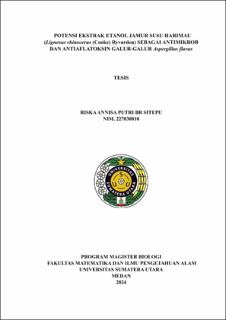Potensi Ekstrak Etanol Jamur Susu Harimau (Lignosus rhinocerus (Cooke) Ryvarden) sebagai Antimikrob dan Antiaflatoksin Galur-Galur Aspergillus flavus
Potential of Ethanol Extract from Tiger Milk Mushroom (Lignosus rhinocerus (Cooke) Ryvarden) as an Antimicrobial and Antiaflatoxin Agent Against Aspergillus flavus Strains

Date
2024Author
Sitepu, Riska Annisa Putri Br
Advisor(s)
Hastuti, Liana Dwi Sri
Nurtjahja, Kiki
Metadata
Show full item recordAbstract
Tiger milk mushroom (Lignosus rhinocerus (Cooke) Ryvarden) is known for its
various health benefits. This study aims to evaluate the potential of ethanol extract
from tiger milk mushroom as an antimicrobial and antiaflatoxin agent against strains
of Aspergillus flavus. The ethanol extract was obtained from the sclerotia of Lignosus
rhinocerus through a maceration process. Phytochemical analysis of the ethanol
extract of Lignosus rhinocerus showed that the extract tested positive for alkaloids and
glycosides, while GC-MS analysis detected 29 compounds, with ambrettolide being
the main compound. Antibacterial and antiyeast activities using the disk diffusion
method showed the largest inhibition zone against Streptococcus epidermidis ATCC
12228, measuring 18.7 ± 0.7 mm. Antifungal activity using the addition of extract to
Potato Dextrose Agar (PDA) medium showed the greatest mycelial growth inhibition
against Aspergillus niger, at 57%. Isolation of A. flavus from corn yielded 7 isolates
whose characteristics matched identification manuals both macroscopically and
microscopically. Toxigenicity testing using Coconut Agar Medium (CAM) and Trigit
software indicated that out of the 7 A. flavus strains obtained, 5 were toxigenic and 2
were non-toxigenic, with the AF6 isolate showing the most intense yellow pigment. The
AF6 isolate was then tested for aflatoxin inhibition by adding ethanol extract of
Lignosus rhinocerus to CAM and PDA media, showing inhibition of mycelial growth
both macroscopically and microscopically, as well as a reduction in yellow pigment.
These findings suggest that L. rhinocerus holds great promise as an antimicrobial and
antiaflatoxin agent, applicable in the food and agricultural industries to improve food
safety and manage aflatoxin contamination.
Collections
- Master Theses [266]
